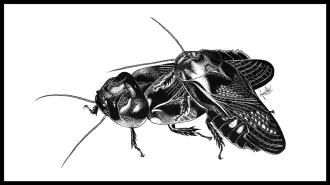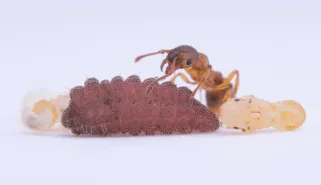Lizard mom’s microbiome may protect her eggs

Female striped plateau lizards may be able to protect their eggs with microbes, a group of scientists is finding.
Paraflyer/Wikimedia Commons (CC-BY-SA 2.0)
COLUMBIA, Mo. — Human babies born via cesarean section miss out on an opportunity to pick up beneficial microbes that other babies get when they take a trip through mom’s vagina. And even though the scientific jury’s still out on whether this is a good idea, some parents have been wiping their C-section babies down with vaginal fluid in the hopes that their newborns might get some of those microbial benefits, Laura Sanders reported earlier this yearover at the Growth Curve blog.
Microbial transfer from mom to offspring happens in a lot of species, but researchers are more familiar with how species that give live birth do this than those that lay eggs, biologist Stacey Weiss of the University of Puget Sound in Tacoma, Wash., noted August 1 at the 53rd Annual Conference of the Animal Behavior Society. Researchers have found that moms can transfer microbes right into the egg itself before it is laid or onto or near the egg after laying.
But Weiss thinks that such microbial transfer might happen through another route — as eggs travel through a female animal’s cloaca. (The cloaca is a combination of genital tract and end of the digestive system found in many invertebrates and most vertebrates, except most mammals.) She and her colleagues have been studying whether striped plateau lizard moms transfer microbes that protect their eggs from pathogens.
“Pathogenic infection is one of the leading causes of egg mortality,” she said. And some studies have proposed that microbes might be able to protect against those infections. None have yet proposed that the source of the microbes could be the cloaca, but this might be a common source since “all vertebrate eggs go through cloacas, and all cloacas have microbes,” she said.
Weiss latched onto the idea that microbes from the cloaca might be important after noticing that when she obtained eggs through dissection, they tended to have a lower survival rate than eggs that were laid. The dissected eggs often succumbed to fungal infections, while the laid eggs did not.
She and her team started by comparing the microbiomes of male and female lizards’ cloacas. “Females are different than males,” she said. Males had more diverse microbial communities in their cloacas. Females were missing whole categories of microbes found in males and had one type that is known to have antifungal activity.
The researchers then compared the microbiomes of eggs that were laid with those that had been dissected out. The team is still waiting on the results of DNA tests that will tell them exactly what kinds of microbes are found on the eggs, but initial results showed that the laid eggs are more likely to have any bacteria at all. “There’s something about going through the cloaca that is increasing bacterial load on these eggshells,” Weiss said. Fungi, though, showed up only on eggs that had been obtained through dissection.
Weiss, her colleagues and some high school students then performed tests in which fungus was applied directly to eggs. They found that laid eggs were able to inhibit fungal growth while dissected eggs were not. So it appears that the mom’s cloaca microbiome may indeed be providing some protection for her offspring.
Weiss said that these results, while still preliminary, may help expand what parental protection of offspring means. In species without direct parental care, transfer of microbes might be an important way that moms and dads help to keep their offspring safe.






